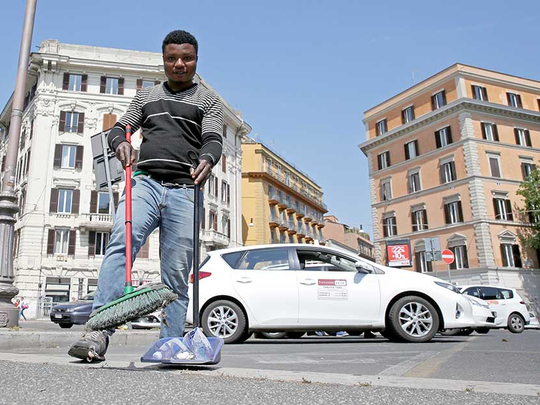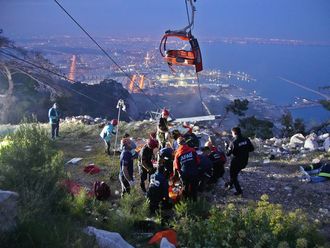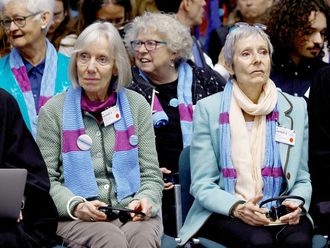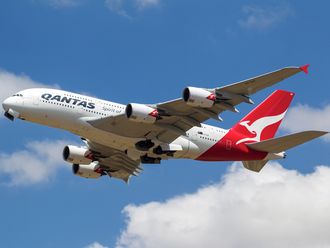
ROME: Carefully sweeping dust and debris off a central Rome pavement and into a pan, Christian Okoro flashes a broad smile at a passer-by who tosses him a coin.
“I am trying to integrate into your society by cleaning our streets,” reads a small cardboard sign he has placed next to a paper cup, hoping for donations from appreciative Romans.
Okoro, 27, from Ebony State in Nigeria, is one of a swelling number of immigrants who, rather than begging on the streets of the Italian capital, are sweeping up for their loose change.
In Rome, where overflowing bins and rubbish strewn streets are a familiar sight, there is a need for their services.
Okoro arrived in Italy last June after paying smugglers 1,500 Libyan dinars (Dh3,941) for the risky passage in a rubber dinghy. His journey through the Niger desert, up through Libya and towards an eventual rescue at sea by emergency services is a grimly familiar story for the more than half a million people who have arrived on Italy’s shores since 2014.
In recent weeks, signs like Okoro’s have been cropping up all over the city, and he says he has recruited 20 other young men from the migrant camp he lives in at nearby Latina.
“People say ‘bravo’, they say tell your people to come and do this,” says Okoro, who was a builder in his native Nigeria.
The sub-Saharan Africans and Bangladeshis who come to Italy can request permits to stay, but the process takes time and they struggle to find work in a country with one of the lowest employment rates in the European Union.
Sweeping a leafy street in northern Rome, James Osas, 35, who arrived in Italy from Delta State in Nigeria two years ago, said cleaning kept him active while he waits for a residence permit to work legally.
“I want to find a job. Any job would do,” he said.
“It’s not easy for [Italians] either. Many of them don’t have jobs because of the crisis.” Matteo Pennacchi, a 45-year-old travel agent and writer from Rome, says he suggested sweeping the streets to two Nigerians and kitted them out with written signs and T-shirts.
Word got around and now he says some 200 of them are doing it, earning up to €30 (Dh123) a day compared with €10 they previously earned from begging.
“The Italians are thrilled,” Pennacchi said. “Some people ask where [Roman waste management company] AMA is, they create controversy, but the feedback is excellent.” Okoro says he is pleased to be doing something to help the environment in a country where he has felt welcome.
“People come to Rome from all over the world to see the architecture so it needs to be clean,” Okoro said. “Thousands of migrants could not finish all the sweeping.”












